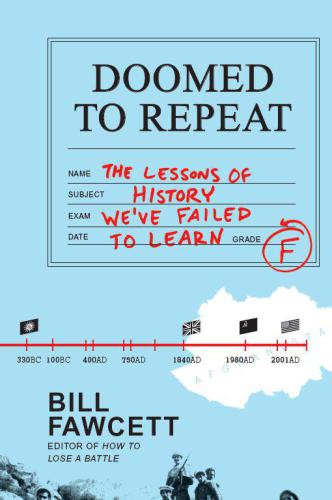
Doomed to Repeat
The Lessons of History We've Failed to Learn
کتاب های مرتبط
- اطلاعات
- نقد و بررسی
- دیدگاه کاربران
نقد و بررسی

January 21, 2013
The weight of history hangs heavy as Fawcett (How to Lose a Battle) examines a slew of today’s social and economic issues in light of their prior manifestations. In a range of insightful and accessible essays, the author dwells on everything from why Afghanistan is easy to invade but impossible to hold, to the dangers of inflation, millennia of terrorism, and the rise and fall of the middle class. Of special note is his lengthy and foreboding comparison of America to Rome, and his examination of how superpower nations inevitably collapse ends on a surprisingly hopeful note. The choice of topics is somewhat imbalanced: of fourteen essays, six are concerned with economic issues, while Afghanistan, Egypt, Britain, and sub-Saharan Africa each get a chapter, and though the writing sometimes lapses into a dry, academic tone, the material is primarily aimed at the casual reader, making this something of a primer on pressing current events and their historical precedents. The underlying message—that “we need to learn from the past to solve today’s problems”—is an optimistic cliché by this point, but it’s sobering to consider how we have yet to take it seriously. Fawcett’s entertaining and educational collection makes it clear it’s high time we listen—and listen closely—to history.

February 1, 2013
In this search for guidance from the past, pop historian Fawcett (Trust Me, I Know What I'm Doing: 100 More Mistakes that Lost Elections, Ended Empires, and Made the World What It Is Today, 2012, etc.) surveys disparate issues ranging from terrorism and pandemics to unemployment and recessions. However, any book that attempts to derive lessons from history must first get the facts right. This one is replete with falsehoods and fantasies that startle and amaze. Among the author's more astonishing assertions: Ethiopia successfully repelled the Italian invasion of 1935; in 1915, Turkish troops killed 27,000 Armenians in Monastir, Tunisia; on October 9, 2002, the stock market crashed, and Yahoo stock lost 90 percent of its value in less than two days. The first assertion is sadly false, while the other two are pure fabrications. Perceptive readers will quickly lose confidence in any of the author's purported statements of fact and thus, with any conclusions that might be drawn from them. Even when Fawcett correctly recognizes a historical trend, the lessons he perceives are generally both obvious and useless. Afghanistan is a fractured nation that resists foreign occupiers and central government. Africa must overcome tribalism and corruption if it is to prosper. Hyperinflation can be ruinous. And the even less helpful: "What history seems to give us today are questions, not solutions." Fawcett sees America going the way of the British and Roman empires if we don't, well, do something, like strengthen the middle class. How? Neither history nor Fawcett seems to know. Superficial analysis and a rash of factual errors combine to drain this volume of any value it might otherwise have had.
COPYRIGHT(2013) Kirkus Reviews, ALL RIGHTS RESERVED.

























دیدگاه کاربران